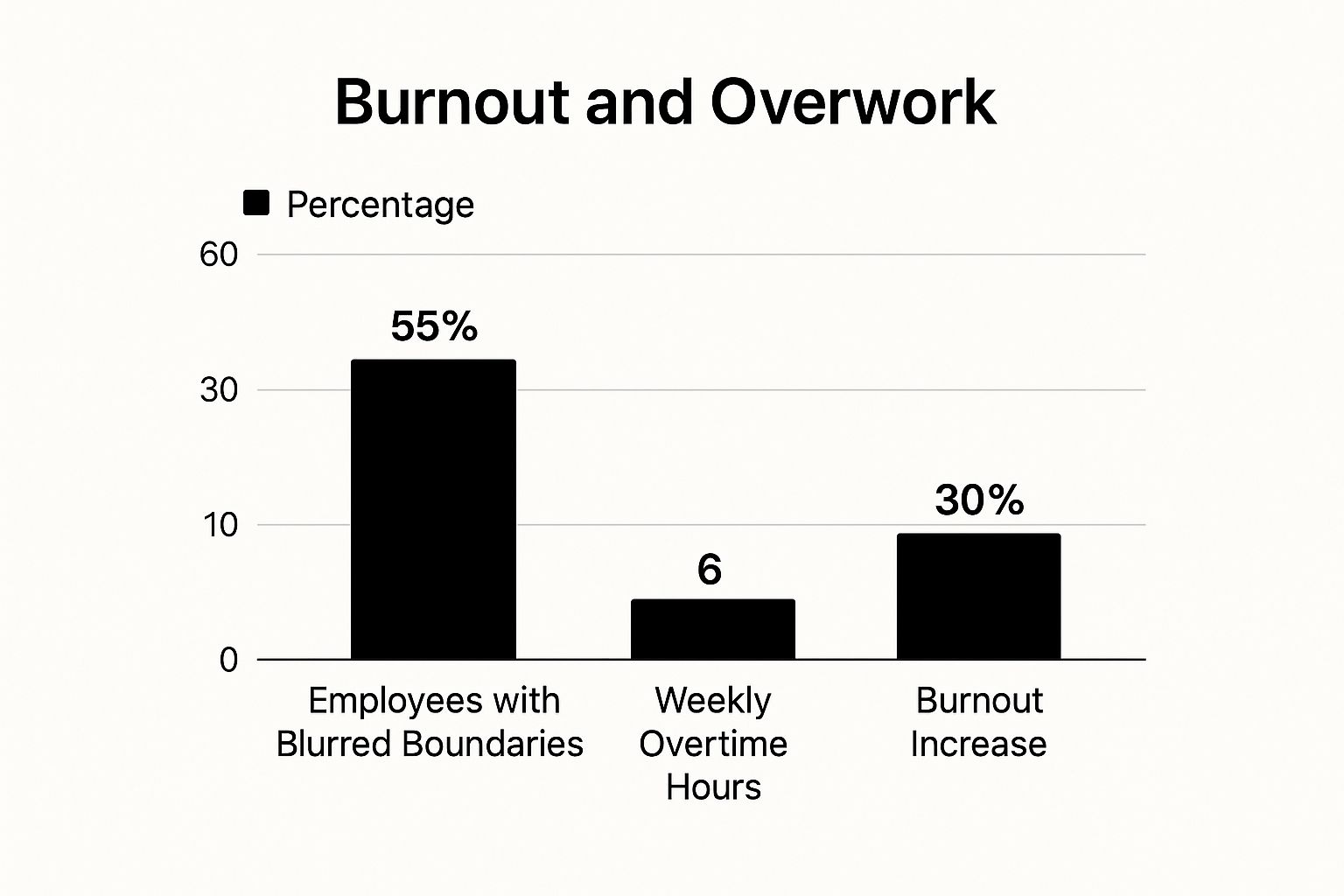Clear Work Life Boundaries for Working Dads
Let's be real for a minute: the whole idea of "work-life balance" feels like a setup. It paints this picture of a perfectly even scale, a 50/50 split that, for a married, working dad, is a complete myth. Chasing it just leaves you feeling like you're failing everywhere.
A much better way to think about it is establishing strong work-life boundaries. These aren't about achieving some magical equilibrium; they're about building clear, intentional lines in the sand that protect your time and your sanity. They let you be fully present, wherever you are.
Why Boundaries Beat Balance Every Single Time
The old-school concept of work-life balance suggests a scale that must always be level. That mindset is a one-way ticket to feeling stretched thin, constantly guilty, and completely burnt out. It's a recipe for disaster.
Switching your focus to boundaries is a total game-changer. It’s about building fences, not walking a tightrope. This is a proactive strategy. Instead of just reacting to every demand that comes your way, you decide ahead of time what gets protected.
This shift empowers you to shield the things that truly matter—like family dinners, your kid's soccer game, or just an hour to decompress—without feeling like you’re letting everyone down at work. It’s not just a small tweak in wording; it's a fundamental change in how you run your life.
The Real Cost Of Blurred Lines
When work consistently creeps into your personal time, the consequences are very real. That constant pull of late-night emails, after-hours calls, and the pressure to always be "on" destroys your ability to recharge. This isn't just about feeling tired; it has a direct, measurable impact on your health, your relationships, and even your performance at work.
The data doesn't lie. Look at what happens when work-life boundaries get fuzzy.

These numbers paint a clear picture: when boundaries disappear, overtime hours pile up, and so does the risk of hitting a wall. A 30% increase in burnout is no joke.
“Creating boundaries isn’t about saying ‘no’ to everything. It’s about saying ‘yes’ to the things that matter most—at work and at home.”
This is the key insight. Boundaries aren't about being difficult or uncooperative. They're about being intentional. It's about protecting your energy for the things that have the biggest impact, both in your career and with your family.
To really nail this, you have to get your mindset right first. Moving from the frustrating pursuit of 'balance' to the empowering act of setting 'boundaries' is the first, most critical step.
The Mindset Shift From Balance to Boundaries
| Focus Area | Old Mindset (Work-Life Balance) | New Mindset (Work-Life Boundaries) |
|---|---|---|
| Core Goal | Trying to give equal time to everything, all the time. | Protecting specific, high-priority times and activities. |
| Feeling | Often feels like you're failing, stretched too thin, and guilty. | Feels empowering, proactive, and intentional. |
| Approach | Reactive—responding to demands as they come in. | Proactive—deciding in advance what is non-negotiable. |
| Outcome | Leads to burnout and a feeling of constant compromise. | Preserves energy for what matters and allows you to be fully present. |
Making this mental shift is a crucial first step. If you're looking for more ways to make this work for your family, we've got more strategies for balancing work and family life in our detailed guide.
It’s also worth noting that where you live plays a big role. In Italy, which scores a 9.4/10 on the OECD work-life balance index, only 3% of employees work over 50 hours a week. Compare that to the United States, which sits way down at 29th place with a score of 5.2, partly because there's no national paid parental leave. These cultural and policy differences show just how much external factors can shape our ability to set and maintain healthy boundaries.
Defining Your Core Non-Negotiables

Before you can build strong fences, you need to know exactly what you’re protecting. This is where you map out your personal “Boundary Blueprint.” It’s a foundational step that moves you past vague ideas like "more family time" and gets right down to the specific, concrete things that make a week feel successful.
Think of these as your personal rules of engagement. They aren't just fuzzy goals; they are the absolute must-haves that, when you stick to them, make you feel present and in control. Without them, you’re just reacting to everyone else’s priorities.
What Really Matters to You?
To get started, you need to do a quick but honest self-audit. Forget what you think you should value. Focus on what genuinely fills up your tank and contributes to your family’s happiness. This isn’t about judging yourself—it’s about getting crystal clear for the future.
Grab a notebook or open a doc and really think through the different parts of your life. The key here is brutal honesty. This process is crucial for establishing effective work-life boundaries that actually stick.
A study in the Journal of Organizational Behavior found that employees with clear boundaries were less likely to think about work after hours, which is a powerful buffer against stress.
That's exactly what we're after—the ability to mentally check out from work and be 100% present with your family.
Your non-negotiables are the bedrock of this whole thing. They simplify your decisions. When a last-minute request pops up, you won’t have to spin your wheels debating it; you just measure it against your blueprint.
From Vague Ideas to Concrete Rules
The real magic happens when you turn broad wishes into specific, actionable rules. It's easy to ignore a vague goal like "spend more time with the kids." It’s much harder to ignore a concrete rule.
Here’s how you can translate those fuzzy desires into solid non-negotiables:
-
The Vague Idea: "I want to be there for bedtime."
- The Concrete Non-Negotiable: "I never miss bedtime stories on weeknights. My phone is off from 7:30 PM to 8:00 PM."
-
The Vague Idea: "I need to exercise more."
- The Concrete Non-Negotiable: "I block off one hour on my calendar for a solo workout three times a week. It's a protected appointment."
-
The Vague Idea: "I should connect more with my partner."
- The Concrete Non-Negotiable: "We have a device-free dinner together at least four nights a week."
One dad I know, a project manager named Mark, realized his biggest stressor was weekend work bleeding into his family time. He set one simple non-negotiable: "I do not open my work laptop between Friday at 6 PM and Monday at 8 AM. No exceptions."
That single rule gave him his weekends back and completely changed his connection with his kids. Your non-negotiables become your personal policies for a better life.
Communicating Your Boundaries with Confidence
Figuring out your non-negotiables is a massive personal win. But let’s be honest, the real test comes when you actually have to tell people about them. This is the moment where a lot of dads freeze up, worried about rocking the boat or looking like they’re not a team player.
But here’s the thing: clear communication is an act of respect. It’s respect for yourself, your family, your boss, and your team. You’re not drawing a line in the sand; you’re simply clarifying how you operate at your best, both at work and at home. When you frame it as a partnership, you’ll be surprised how receptive people can be.
Scripts for the Workplace
Voicing your new work life boundaries at the office can feel like walking on eggshells. The trick is to be confident, direct, and frame it around positive outcomes—like better focus and sustained productivity. You’re not asking for permission. You're stating what you need to do your best work.
Here are a couple of go-to scripts for those all-too-common situations:
-
When a last-minute request lands after hours:
- Say this: "I can give this my full attention first thing in the morning. I'm offline for the evening with my family to recharge for tomorrow."
- Not this: "I can't right now, I'm busy."
-
When you need to protect your focus time:
- Say this: "Just a heads-up, I'm blocking my calendar from 9-11 AM for deep work on the quarterly report. I'll be available for questions after that."
- Not this: "Don't bother me in the morning."
Being clear is a kindness, even if the message isn't what people want to hear. Ambiguity creates stress for everyone, whereas clarity provides a predictable and respectful structure to work within.
This kind of proactive communication cuts off misunderstandings before they start. It shows you’re serious about all your commitments, both professional and personal.
Talking with Your Partner
Your most important team is right there at home. Setting boundaries isn’t a solo mission; it's a team sport that requires open conversation and collaboration with your partner. This isn’t just about protecting your time. It’s about making sure you both get what you need to feel human.
These conversations are best had during a calm, dedicated moment—not in the middle of a stressful Tuesday night. Using a structured approach can make a world of difference. You can even use our guide for creating a productive family meeting agenda to make these talks a regular, positive part of your routine.
The goal here is simple: get on the same team and work together to protect your family’s well-being.
It's also worth remembering that cultural expectations play a huge role. The Global Life-Work Balance Index reveals just how different things can be around the world. For instance, countries like New Zealand, which provides 32 days of statutory annual leave, foster a very different environment than the United States, which ranks 59th out of 60 countries. You can see more about how countries compare on Remote.com. This just goes to show that our personal efforts are part of a much bigger conversation.
Using Technology to Defend Your Time

In our always-on world, it's easy to see technology as the enemy. That constant buzzing, the endless stream of notifications—it can feel like a relentless assault on your personal time.
But what if you could flip the script? What if you could turn that tech from your biggest saboteur into your staunchest ally? By getting intentional, you can actually use your devices to automatically enforce the very work-life boundaries you’re fighting to create.
This is about more than just flicking the “off” switch on notifications, though that’s a decent start. It's about actively configuring your tools to build digital fences that protect your family time, especially when your willpower is shot after a long day.
Automate Your Email Defenses
Let's be honest: your inbox is probably the biggest offender when it comes to invading your evenings and weekends. The good news is, a powerful out-of-office message isn't just for vacations anymore. You can set up a reusable auto-responder for your after-hours.
This isn’t about being unhelpful; it’s about managing expectations clearly and professionally.
Example After-Hours Auto-Responder:
"Thanks for your message. I'm currently offline for the day to be present with my family. I'll see your email when I'm back online tomorrow morning after 8:30 AM. If your request is urgent, please contact [Colleague's Name] at [Colleague's Email]."
This simple script works for you when you can't. It buys you precious, uninterrupted time and gently trains people to respect your hours.
Master Your Calendar and Smartphone
Your calendar and phone are your next line of defense. Stop thinking of them as just tools for tracking meetings and start using them to proactively claim your personal time.
-
Block Your Calendar Aggressively: Don't just block off time for work calls. Schedule "Family Dinner," "Kid's Soccer Game," or even just "Dad Mode – Do Not Disturb." Treat these personal appointments with the same seriousness you would a meeting with your CEO. This creates a visual barrier that helps both you and your colleagues see when you are truly unavailable.
-
Use Focus Modes Religiously: Modern smartphones (both iOS and Android) have incredible focus modes. Set up a "Family Time" or "Evening" mode that kicks in automatically at 6 PM. This can silence every single work-related app and notification while still letting calls from your partner or kids come through. It's a digital fortress that requires zero effort in the moment.
The rise of remote work has shown us how powerful a little flexibility can be. In fact, research shows that having just one remote workday a month can boost employee happiness by 24%, mostly because it gives people more control over their schedule.
You can check out more fascinating work-life balance statistics on 4dayweek.io. Using these tech tricks is a practical way to bring that same level of control into your daily life, creating a much-needed buffer between your work and your family.
How To Adapt When Life Gets Messy

You’ve done the hard work of defining your non-negotiables and communicating the plan. For a while, things are running like a well-oiled machine. Then, inevitably, life happens.
A monster project lands on your desk with a ridiculous deadline. Your kid spikes a fever. Or maybe you're just hit with a wave of pure, bone-deep exhaustion. Suddenly, those carefully constructed boundaries feel like they’re about to shatter into a million pieces.
This is where the real test begins. Good work-life boundaries aren't rigid walls that crumble under the first sign of pressure. Think of them more like flexible fences that can bend without breaking. The goal isn’t perfection; it’s resilience. When life throws you a curveball, you don’t ditch your principles—you adapt them.
Responding to Boundary Creep
Often, the biggest threat isn't one single crisis, but something I call "boundary creep." It’s that slow, subtle erosion of your personal time that you barely notice at first.
It starts with answering one late email. Then a "quick" weekend check-in. Before you know it, you’re right back where you started, feeling like you’re always on the clock.
Recognizing this creep is half the battle. It usually feels like a low-grade hum of stress or that nagging sense that you’re never fully “off.” When you feel it, it’s time for a deliberate reset, not a complete overhaul.
- Acknowledge what's happening: Just say it out loud to yourself or your partner: "Wow, this week has really gotten away from me." Naming the problem takes away some of its power.
- Pinpoint the cause: Was this a one-time project, or has a new expectation crept in without your consent?
- Reclaim one small thing: Don't try to fix everything at once. That's a recipe for failure. Just pick one small boundary to reassert. A great one is committing to being 100% offline during dinner for the next three nights. No exceptions.
The most important part of setting boundaries is knowing how to reset them after a brutal week. It’s not about never failing; it’s about having a plan to get back on track fast.
That small win builds momentum. It's a powerful reminder that you're still the one in the driver's seat, even when life feels chaotic.
The Art of the Temporary Renegotiation
Sometimes, a genuine work emergency or a family crisis means you have to temporarily redraw your lines. This isn't failing. It’s a strategic retreat. The trick is to treat it as a conscious, short-term deal you make with yourself, your boss, and your family.
Let's say a critical project is going to require two late nights this week. Instead of just letting it steamroll your family time, you reframe it.
- Define the Scope: Be crystal clear with everyone. Tell your manager, "I can work until 9 PM on Tuesday and Wednesday for this launch, but I'll be back to my hard stop of 6 PM on Thursday." Then, tell your partner the exact same thing so they know what to expect.
- Plan the "Repayment": Treat that lost family time like a debt you have to repay. Immediately figure out how you'll pay it back. Maybe that means taking a half-day on Friday or making sure your partner gets an equivalent break over the weekend to recharge.
This simple approach stops burnout and resentment before they can take root. It turns a potential crisis into a managed, temporary situation. This flexibility is a core skill, and when stress inevitably builds, having clear ways to cope is a game-changer. For more on that, our guide on stress management for men has some practical strategies that can really help you stay grounded.
Finally, give yourself some grace. You will have weeks where your boundaries are a total mess. It happens to every single working dad I know. Instead of beating yourself up, look at it as data. What did you learn? What trigger threw things off? What can you do differently next time?
That mindset is what builds lasting, sustainable boundaries that actually serve you and your family for the long haul.
Answering Your Toughest Boundary Questions
Alright, let's get real. Even with a rock-solid plan, putting new work life boundaries into action can get messy. It’s one thing to draw a line in the sand, but it's another thing entirely when your boss, your family—or even your own guilt—starts kicking sand over it.
Let's dive into some of the toughest situations working dads run into and figure out how to handle them.
What If My Boss or Company Culture Does Not Respect Boundaries?
This is the big one, and you're not alone in facing it. When you're swimming against a tide of "always-on" expectations, your first move is to control what you can: your own output.
Focus on being ridiculously effective during your core hours. When your work is top-notch and you’re consistently reliable, asking for protected time isn’t seen as slacking off. It's a strategy for maintaining that high level of performance long-term.
You have to frame it in a way that benefits them, not just you.
Instead of saying "I have to leave," try something like: "To be fully recharged and 100% effective for the team tomorrow, I need to sign off at 6 PM." See the difference? You’re shifting the focus from your personal need to the quality of your work.
If the toxic culture just won't budge, even with your stellar performance, start documenting everything. Keep a running list of your contributions and the times you've had to push back on after-hours requests. This isn’t just for show; it's data. And honestly, it might be the clearest sign you’ll ever get that it’s time to quietly start looking for a company that actually walks the walk on work-life balance.
How Do I Handle Guilt About Taking Personal Time?
That little pang of guilt? It’s not a weakness. It's proof that you’re a good dad and a caring partner who takes his responsibilities seriously. But you have to reframe what that feeling means. You are not taking time from your family; you are recharging for them. A dead battery can’t power anything.
The fastest way to kill the guilt is to make it a team sport. You and your partner are in this together.
Sit down with your spouse and get intentional about it. Schedule protected "recharge" time for both of you. When you’re both actively making sure the other person gets a real break, you’re a team working together to prevent burnout. It stops being about "my time vs. your time" and becomes about "our family's well-being." That small shift is a total game-changer.
How Should I Deal with a True Work Emergency After Hours?
Let’s be honest, real emergencies happen. Being flexible shows you’re a team player and builds trust. The trick is to prepare for these situations before they blow up your evening.
First, sit down with your manager and define what a true "emergency" actually is. Is it a server crashing? A massive client crisis? Or is it just someone else's poor planning? Getting that clarity upfront stops everyday tasks from turning into five-alarm fires.
When a genuine emergency does pop up after hours, handle it—but don’t let it be a free-for-all.
- Set a time limit: "I can jump on this now until 9 PM, but then I have to be offline until the morning."
- Reclaim the time: Think of that lost evening as a "time debt" that the company owes you and your family. Maybe you take a longer lunch the next day or you sign off an hour early on Friday. Make sure you get that time back.
This approach lets you be the hero when needed, without letting emergencies completely bulldoze the strong work life boundaries you’ve fought so hard to build.
At Vibrant Dad, we believe that setting strong boundaries is the key to becoming the present, engaged father and partner you want to be. For more strategies and support on your journey, explore everything we have to offer at https://vibrantdad.com.






